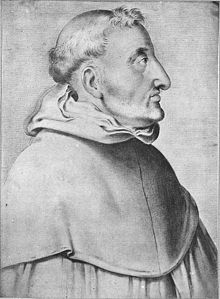Luis de Granada

Fray Luis de Granada (* 1504 in Granada ; † December 31, 1588 in Portogallo near Lisbon ; often referred to as Ludwig von Granada in German editions of his works ; actually Luis de Sarria ) was a Spanish mystic , priest from the Dominican order and spiritual writer .
Life
The son of poor parents, Luis de Granada became a Dominican in Granada in 1524 . After 1544 he preached in Cordoba for ten years . In 1557 he took over the leadership of the Portuguese order province and became spiritual companion of Queen Joan of Spain (1535–1573). Luis wrote many works on asceticism and meditation ; his most important books were De la oración ("On Prayer", 1533) and Guia de pecadores ("Driver of sinners", 1555). This work was examined by the Inquisition , but suspicions were dropped that Luis' ideas were similar to those of the Alumbrados. Pope Gregory XIII wrote to Luis de Granada: "As many as you have read your writings with benefit, you have produced so many sons in Christ and have done them far greater benefit than if you had begged the blind to face and the dead for life" (printed on Beginning of the Lenkerin der Sünder , German edition 1843) Luis had a great influence on the spiritual literature of the late 16th century. His works were also repeatedly published in German up until the 20th century.
Quotes
“Prayer is an elevation of the soul above itself and all that has been created, a union with God and an immersion in the depths of immeasurable sweetness and in the sea of divine love. Prayer is the soul's exit to receive God when He comes to her. She draws him to her like a neighbor: she takes him into her inn as in his temple. There she owns Him, loves Him, and enjoys Him. Prayer is the position of his soul in God's presence, and the transfer of God into the presence of the soul by looking at the soul with the eyes of mercy, and God looks at it with the eyes of humility. This looking has greater power and fertility than the sight of all the stars and planets in the sky. "
“Prayer is [...] the clearest mirror in which one recognizes God; one also recognizes the human being in it with all its shortcomings, imperfections and poor things. Prayer is a daily exercise of many virtues, a mortification of sensual desires, a fountain of every good purpose and every good desire. "
Works (selection)
- Die Lenkerin der Sünder , German edition from 1843 in the Google book search
- Devout reflections on the life of our divine Lord and Savior Jesus Christ , German edition from 1826 in the Google book search
- Contemplation in God on the ways of the spiritual life , German edition 1838 in the Google book search
- The good works of the Catholic Church: praying, fasting, giving alms , German edition 1839 in the Google book search
- The sinner's spiritual Belaitsman, More The spiritual Kempffer ; Translated into German by Adam Walasser, Dillingen 1574 in the Google book search
Web links
- Literature by and about Luis de Granada in the catalog of the German National Library
- Works by and about Luis de Granada in the German Digital Library
- Luis Fernando Figari: El maestro Fray Luis de Granada (1504-1588) (Spanish)
- Spanish literature . In: Meyers Konversations-Lexikon . 4th edition. Volume 15, Verlag des Bibliographisches Institut, Leipzig / Vienna 1885–1892, pp. 88–97.
| personal data | |
|---|---|
| SURNAME | Luis de Granada |
| ALTERNATIVE NAMES | de Sarria, Luis (real name); Louis of Granada |
| BRIEF DESCRIPTION | Spanish mystic, priest from the Dominican order and spiritual writer |
| DATE OF BIRTH | 1504 |
| PLACE OF BIRTH | Granada |
| DATE OF DEATH | December 31, 1588 |
| Place of death | Portogallo |